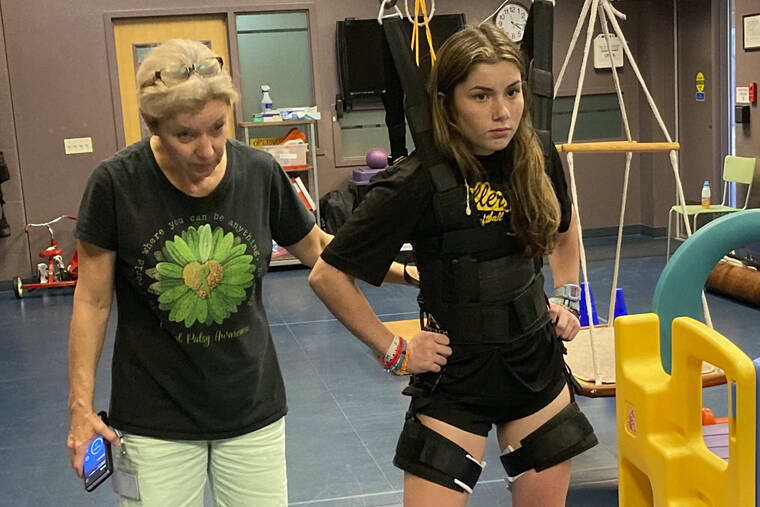PHOENIX — Charlie Duffy’s left leg wobbles forward like a half-cooked noodle, her toe missing the mark before the sole shakily slides to the mat. Her brain tells the leg to move sideways next, but the message is garbled, so it starts back before correcting.
Supported by a zero-gravity device, Duffy completes the exercise by attempting to reach back, the unsteady leg oscillating like it’s being pulled by strings, finishing with a shaky double tap.
Surgery was two months ago. Her left femur was rotated and an extender plate inserted, the Achilles tendon cut and lengthened. Recovery for most focuses on learning to walk again, building strength and balance, lessening pain.
This determined 15-year-old with cerebral palsy has a more ambitious goal: a return to the softball field in January.
“She’s had a lot of setbacks because of her surgeries, but it almost motivates her to come back harder,” said Karla Verdugo, marketing manager for United Cerebral Palsy of Central Arizona. “I always knew she was going to be different.”
The braces, crutches, the gait often elicit a subconscious response: the disability makes this person lesser.
First glances don’t show the underlying fortitude it takes just to get through daily life.
Charlie Duffy overflows with it.
As a small child, she was proud of her disability, showing off her cast and braces to kids at school, telling everyone she could about CP.
As she grew older, some of the kids, as kids typically do, made her realize she was a little different because of her disability.
Instead of shrinking, she hardened her determination, pushed herself to prove them wrong. Duffy willed herself to do the same things as the “normal” kids, including all sorts of sports growing up. She played soccer in a cast and was often faster than many of the boys on the flag football field.
Duffy made the Northwest Christian varsity softball team as a freshman and was a key cog on a team that reached the state semifinals last season.
“I just realized that like God made me who I am for a reason, and that everybody has a story and this is just part of my story,” she said.
Roughly 764,000 people in the United States have cerebral palsy, according to cerebralpalsy.org. More than half the children with CP can walk independently.
Duffy is among them.
While learning to walk, she stepped using only her toes on her left foot and struggled with balance, leading to a diagnosis of hemiplegic cerebral palsy. A lesion on her brain caused a stroke in utero, which short-circuited the communication between the brain and the left side of her body. The muscles in her leg also tighten like a wrung-out wet towel, torqueing bones in the process.
Duffy had her first surgery around 3 and began painful serial casting Botox treatments designed to reduce muscle tightness. At 7, she had her first major surgery, a cut-and-lengthening procedure similar to her most recent one.
Duffy’s had roughly two dozen procedures — and counting.
“It’s hard, but she’s incredibly resilient and determined,” Duffy’s father Charles said. “It’s pretty inspiring and I’m not saying that just because she’s my kid.”
His daughter’s conviction is there for everyone to see.
When she first started physical therapy, Duffy attacked it with unbridled zest, often creating games of her own to make the sometimes-grueling sessions fun.
As she grew older, the mental toll caught the physical cost, leaving her frustrated yet undeterred. Even as she learned to walk all over again, Duffy pushed forward with every shaky step, the smile always returning through the determined grimaces.
“She lives her life without limits,” said her therapist Atalie Ho Lem, echoing the United Cerebral Palsy tagline. “She’s confident, but she’s humble, which is important in her journey.”
The journey that has circled back to the days when she would tell everyone she could about CP.
Duffy has documented her progress and pitfalls via Instagram, posting photos and videos pre- and post-surgery, physical therapy sessions and home workouts with inspirational messages.
Duffy has expanded her reach as a United Cerebral Palsy ambassador, sharing her story as a speaker, through social and other media opportunities, marketing photo shoots — all in hopes of inspiring other kids and adults with CP.
“I get opportunity to share my story and be living proof of somebody with cerebral palsy doesn’t mean that we have to slow down or live our lives any different,” she said. “Our disability is just something it doesn’t define us whatsoever.”
Duffy is the walking and running and softball-playing proof.



